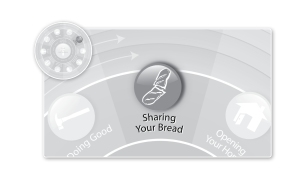Part VI of our series on Sharing Your Bread
 An astonishing amount of the Bible is devoted to the stories of people who reject the call of God. And now that we’re becoming disciples who extend the invitation of Christ to others, it’s important for us to re-read the Scripture through the lens of the God who says (in Romans 10:21), “All day long I have held out my hands to a disobedient and obstinate people.”
An astonishing amount of the Bible is devoted to the stories of people who reject the call of God. And now that we’re becoming disciples who extend the invitation of Christ to others, it’s important for us to re-read the Scripture through the lens of the God who says (in Romans 10:21), “All day long I have held out my hands to a disobedient and obstinate people.”
The Scripture is the record of God holding out his hands to a disobedient and obstinate people known as the human race.
One of the central themes of the Scripture is that the people who need God, the people who should recognize him, the people to whom he has done nothing but good reject him, ignore him, and ultimately—in the case of Christ—side with the powers of darkness that oppress them in order to crucify him.
- 2 Chronicles 24:19 (NKJV) says, “He sent prophets to them, to bring them back to the LORD; and they testified against them, but they would not listen.”
- Isaiah 30:10 (NIV) says, “They say to the seers, ‘See no more visions!’ and to the prophets, ‘Give us no more visions of what is right! Tell us pleasant things, prophesy illusions.'”
- John 1:10-11 (NIV) says, “He was in the world, and though the world was made through him, the world did not recognize him. He came to that which was his own, but his own did not receive him.”
Sometimes it’s so painful that all you can do is laugh.
You have these friends who are always sad and struggling and talking about how bad their life is. And then you invite them to join you in receiving the word of life and they come up with the silliest excuses. The meeting time is too early. Then, it’s too late. The gathering is too formal. Then, it’s too loose. They’re too busy to come to the gathering, but they’re never too busy to moan for hours about how much they’re struggling.
Jesus understood that all too well. In Matthew 17:19, he summarizes his generation this way:
17 “‘We played the pipe for you, and you did not dance; we sang a dirge, and you did not mourn.’18 For John came neither eating nor drinking, and they say, ‘He has a demon.’ 19 The Son of Man came eating and drinking, and they say, ‘Here is a glutton and a drunkard, a friend of tax collectors and sinners.’”
If that were the end of the story, it would be a rather discouraging one, indeed. But fortunately there’s another theme that runs all the way through the Scripture. The Apostle Paul describes it this way in Romans 10:19-20:
“I will make you envious by those who are not a nation;
I will make you angry by a nation that has no understanding.”[j]20 … “I was found by those who did not seek me;
I revealed myself to those who did not ask for me.”
Never forget that the reason you’re here in the first place is because the people who should have believed, rejected the invitation of Christ.
But the Apostle Paul warns us in Romans 11 that that fact should make us humble, not proud:
17 If some of the branches have been broken off, and you, though a wild olive shoot, have been grafted in among the others and now share in the nourishing sap from the olive root, 18 do not consider yourself to be superior to those other branches. If you do, consider this: You do not support the root, but the root supports you. 19 You will say then, “Branches were broken off so that I could be grafted in.” 20 Granted. But they were broken off because of unbelief, and you stand by faith. Do not be arrogant, but tremble. 21 For if God did not spare the natural branches, he will not spare you either.
22 Consider therefore the kindness and sternness of God: sternness to those who fell, but kindness to you, provided that you continue in his kindness. Otherwise, you also will be cut off. 23 And if they do not persist in unbelief, they will be grafted in, for God is able to graft them in again. 24 After all, if you were cut out of an olive tree that is wild by nature, and contrary to nature were grafted into a cultivated olive tree, how much more readily will these, the natural branches, be grafted into their own olive tree!
And this is what the story we’ll be learning about in next week’s blog posts is all about. It weaves together all three of those themes that we just mentioned:
- God reaches out to the people who should respond to him, and they don’t; so
- God reaches the people who no one thinks will respond to him, and they do; but
- their response should lead to gratitude and humility, not pride.
The story is called the Parable of the Wedding Feast, and Jesus tells it to the chief priests and the Pharisees – those who should have responded to his invitation to feast – but didn’t.
In what ways are you like those who mumble and groan about their circumstances but don’t accept help when it comes? Are you not responding to God in an area you should be?











Pingback: Resources for 2 Chronicles 25:24 - 26:2
Pingback: Why is Feasting So Important to Jesus? | Rev. Eric Foley